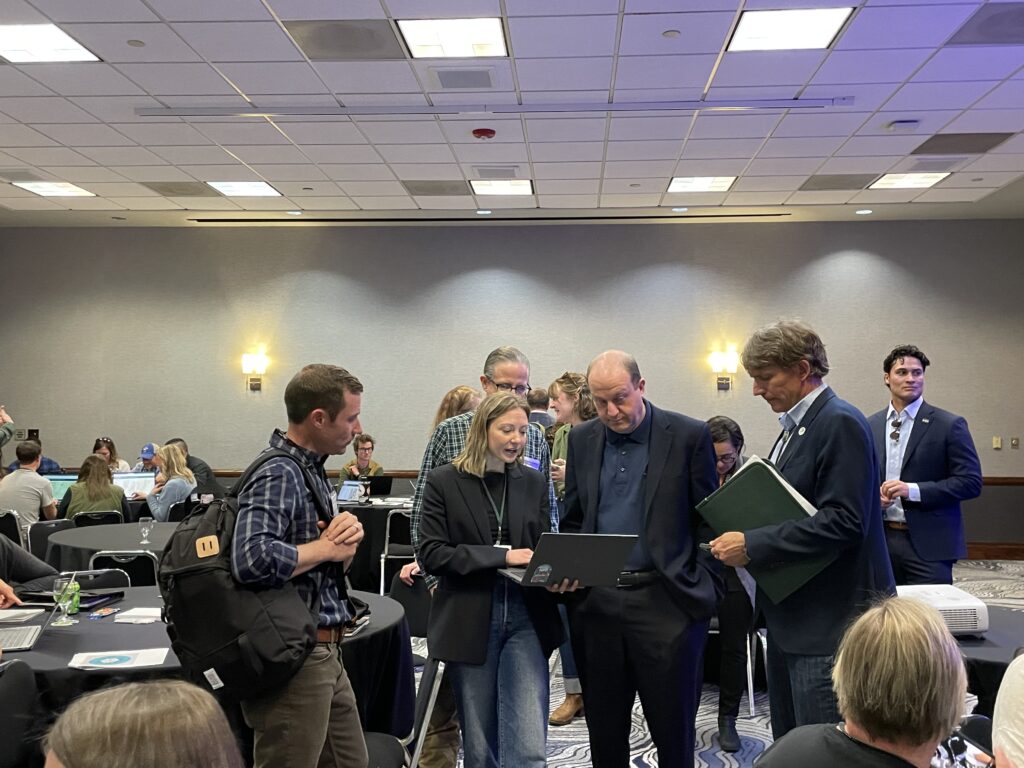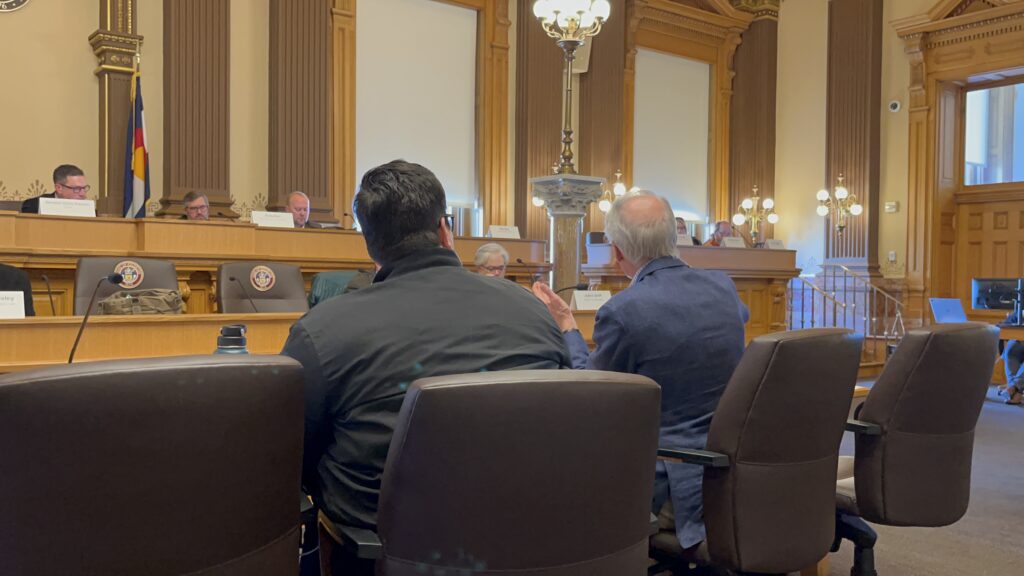Collaborative Governance: Building Trust, Shaping Policy, Delivering Solutions
For 50 years, Keystone Policy Center has helped communities, agencies, and institutions navigate some of the most difficult challenges facing our society. At the heart of that work is a simple but powerful idea: collaborative governance.

What Is Collaborative Governance?
Collaborative governance is the process of bringing people together — across levels of government, sectors, and communities — to shape public decisions through dialogue, not division. It’s an alternative to the status quo of gridlock, distrust, and top-down decision-making. And it’s a model that Keystone has used to great effect at the local, state, federal, and tribal levels.
At Keystone, sometimes we partner directly with government, whether to support a legislatively mandated process, lead a voluntary initiative, or build a community-informed framework to address high-stakes issues. Sometimes we serve a more informal role to create the space, structure, and trust that allow meaningful collaboration to happen, even when tensions are high and the path forward isn’t obvious.
We bring people together who might not otherwise speak. We create the environment to help them share their voice as well as listen, learn, and ultimately, lead together.
Why It Matters
Today’s public challenges are often too complex to solve in isolation. They require input from many perspectives. They demand transparency, shared responsibility, and a willingness to build consensus across differences.
That’s what collaborative governance delivers.

What It Looks Like in Practice
Keystone’s collaborative governance work takes many forms and happens at every level of government. At the local level, we helped transform conflict into consensus in Routt County, Colorado, where tensions over trail development led to the creation of the Routt Recreation and Conservation Roundtable. This standing group now helps land managers and community stakeholders shape recreation and conservation projects through shared dialogue and non-binding recommendations. In Boulder, we supported the city’s renewed government-to-government consultation with American Indian Tribes, helping build a long-term framework for collaboration rooted in respect, accountability, and shared stewardship.
At the state level, Keystone facilitated the Office of Just Transition’s early efforts to support coal-dependent communities planning for a future beyond coal. Rather than imposing top-down solutions, we helped workers, local officials, and community members define their own paths forward. We also designed and led the process for Colorado’s bipartisan Commission on Property Tax, guiding state legislators and the general public through difficult discussions to reach practical, consensus-driven recommendations.
At the federal level, Keystone continues its decades-long legacy of energy-related facilitation through our partnership with the Department of Energy. Our current work supports consent-based siting for spent nuclear fuel — ensuring communities are engaged early, transparently, and meaningfully in decisions that affect them. Our Energy Board has also helped shape national transmission policy, with recommendations that made their way into federal legislation. And through our leadership of the Rocky Mountain Family Engagement Collective, we’re working with state education leaders, districts, and families to create stronger school systems across the state.
Explore the Stories
We’ve recently launched a two-part podcast series as part of our 50th anniversary celebration, exploring how collaborative governance comes to life across the country.
These episodes feature voices from from our partners in this work, highlighting real stories, real stakes, and real progress.


 Effective March 1, 2025, Thomas J. Vilsack, former United States Secretary of Agriculture and Governor of Iowa, became the first Chief Executive Officer for the World Food Prize Foundation. In this new role, Governor Vilsack is focusing on expanding the Foundation’s global network, and will further position the Foundation as a leader in addressing global food and nutrition insecurity, continuing his lifetime of public service.
Effective March 1, 2025, Thomas J. Vilsack, former United States Secretary of Agriculture and Governor of Iowa, became the first Chief Executive Officer for the World Food Prize Foundation. In this new role, Governor Vilsack is focusing on expanding the Foundation’s global network, and will further position the Foundation as a leader in addressing global food and nutrition insecurity, continuing his lifetime of public service. Shelby Coffey III is a distinguished journalist, media executive, and thought leader whose career has helped shape the landscape of American news and public discourse. Over several decades, Coffey has held some of the most influential roles in journalism, including serving as editor of the Los Angeles Times, executive vice president of ABC News, and deputy managing editor of The Washington Post. His editorial leadership extended to key roles as president of CNN Financial News, editor of the Dallas Times Herald, and U.S. News & World Report.
Shelby Coffey III is a distinguished journalist, media executive, and thought leader whose career has helped shape the landscape of American news and public discourse. Over several decades, Coffey has held some of the most influential roles in journalism, including serving as editor of the Los Angeles Times, executive vice president of ABC News, and deputy managing editor of The Washington Post. His editorial leadership extended to key roles as president of CNN Financial News, editor of the Dallas Times Herald, and U.S. News & World Report. Jerry Steiner has spent 40 years involved in agriculture following growing up on a Wisconsin dairy farm. He began his career with Monsanto, in multiple business leadership roles. From 2003-2013 he served as a member of the Executive team, as the company’s Executive Vice President of Sustainability and Corporate Affairs. He led the company’s global Government, Public and Industry Affairs teams across the 70 countries where Monsanto conducts business. This experience got Jerry connected to the Keystones centers work in agriculture. Key among his responsibilities were shaping the company’s public policy and building partnerships aimed at helping farmers around the world produce more food, while conserving valuable resources like water and energy. Two unique partnership that developed under his leadership were drought tolerant corn with 5 African countries, CIMMYT and the Gates foundation, and a building a sustainable business model in Brazil with the value chain leading to significant multi-company investment and soybean varieties that can protected themselves.
Jerry Steiner has spent 40 years involved in agriculture following growing up on a Wisconsin dairy farm. He began his career with Monsanto, in multiple business leadership roles. From 2003-2013 he served as a member of the Executive team, as the company’s Executive Vice President of Sustainability and Corporate Affairs. He led the company’s global Government, Public and Industry Affairs teams across the 70 countries where Monsanto conducts business. This experience got Jerry connected to the Keystones centers work in agriculture. Key among his responsibilities were shaping the company’s public policy and building partnerships aimed at helping farmers around the world produce more food, while conserving valuable resources like water and energy. Two unique partnership that developed under his leadership were drought tolerant corn with 5 African countries, CIMMYT and the Gates foundation, and a building a sustainable business model in Brazil with the value chain leading to significant multi-company investment and soybean varieties that can protected themselves. Jennifer Morris is the Chief Executive Officer of The Nature Conservancy, leading a team of nearly 6,000 staff working in more than 80 countries and territories tackling the dual crises of the
Jennifer Morris is the Chief Executive Officer of The Nature Conservancy, leading a team of nearly 6,000 staff working in more than 80 countries and territories tackling the dual crises of the  Congressman Joe Neguse represents Colorado’s 2nd District in the U.S. House of Representatives. He was elected to his first term in November 2018, becoming the first Black Member of Congress in Colorado history. In December 2022, Rep. Neguse was elected by his colleagues to serve as Chair of the Democratic Policy and Communications Committee (DPCC), becoming the first Coloradan to serve in a senior elected leadership role in the House in over 85 years. He serves on the Natural Resources and Judiciary Committees, and was also appointed by House Minority Leader Hakeem Jeffries to serve as one of four Democrats on the prestigious Rules Committee. Rep. Neguse serves as Ranking Member on the House Subcommittee on Federal Lands, which he previously Chaired in the 117th Congress.
Congressman Joe Neguse represents Colorado’s 2nd District in the U.S. House of Representatives. He was elected to his first term in November 2018, becoming the first Black Member of Congress in Colorado history. In December 2022, Rep. Neguse was elected by his colleagues to serve as Chair of the Democratic Policy and Communications Committee (DPCC), becoming the first Coloradan to serve in a senior elected leadership role in the House in over 85 years. He serves on the Natural Resources and Judiciary Committees, and was also appointed by House Minority Leader Hakeem Jeffries to serve as one of four Democrats on the prestigious Rules Committee. Rep. Neguse serves as Ranking Member on the House Subcommittee on Federal Lands, which he previously Chaired in the 117th Congress. Llewellyn King was born in Southern Rhodesia, now Zimbabwe. He went into journalism as soon as he turned 16, stringing for Time magazine and United Press in Africa.
Llewellyn King was born in Southern Rhodesia, now Zimbabwe. He went into journalism as soon as he turned 16, stringing for Time magazine and United Press in Africa. Steven Williams is the Chief Executive Officer of PepsiCo North America, overseeing a more than $48 billion business that spans PepsiCo’s Foods and Beverage operating units. His leadership encompasses more than 125,000 associates and over 900 locations across the U.S. and Canada. Steven joined PepsiCo in 2001 as part of PepsiCo’s acquisition of the Quaker Oats Company, which he joined in 1997, and has held leadership positions of increased responsibility since.
Steven Williams is the Chief Executive Officer of PepsiCo North America, overseeing a more than $48 billion business that spans PepsiCo’s Foods and Beverage operating units. His leadership encompasses more than 125,000 associates and over 900 locations across the U.S. and Canada. Steven joined PepsiCo in 2001 as part of PepsiCo’s acquisition of the Quaker Oats Company, which he joined in 1997, and has held leadership positions of increased responsibility since.